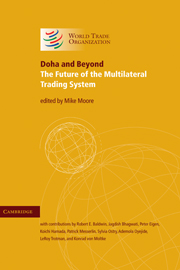Book contents
- Frontmatter
- Contents
- List of contributors
- Introduction
- 1 Trade and sustainable development in the Doha Round
- 2 The WTO: the institutional contradictions
- 3 China's entry into the WTO and its impact on the global economic system
- 4 Key challenges facing the WTO
- 5 Development dimensions in multilateral trade negotiations
- 6 External transparency: the policy process at the national level of the two-level game
- 7 Trading for development: how to assist poor countries
- 8 Controlling corruption: a key to development-oriented trade
- 9 The impact of EC enlargement on the WTO
- Index
- References
3 - China's entry into the WTO and its impact on the global economic system
Published online by Cambridge University Press: 05 August 2012
- Frontmatter
- Contents
- List of contributors
- Introduction
- 1 Trade and sustainable development in the Doha Round
- 2 The WTO: the institutional contradictions
- 3 China's entry into the WTO and its impact on the global economic system
- 4 Key challenges facing the WTO
- 5 Development dimensions in multilateral trade negotiations
- 6 External transparency: the policy process at the national level of the two-level game
- 7 Trading for development: how to assist poor countries
- 8 Controlling corruption: a key to development-oriented trade
- 9 The impact of EC enlargement on the WTO
- Index
- References
Summary
See the waters of the Yellow River leap down from Heaven,
Roll away to the deep sea and never turn again!
At the Yellow-Crane pagoda, where we stopped to bid adieu,
The mists and flowers of April seemed to wish good speed to you.
At the Emerald Isle, your lessening sail had vanished from my eye,
And left me with the River, rolling onward to the sky.
Introduction
China was one of the cradles of human civilization; it has been the centre of Asian civilization for thousands of years. It is an immense country, as the two poems by Li Po (Li Bai) quoted above illustrate. The first poem refers to the Huang He (the Yellow River) and the second to the Chang Jiang (the Yangtze River). Chinese culture is ubiquitous in Asia, whether in terms of art, written characters, classical literature and, of course, food. The entrepreneurship of the overseas Chinese has made them successful wherever they have settled. Thus as it enters the WTO, China must be viewed in the context of Heaven (time), Earth (space) and Man (human organization).
First, China's entry into the WTO marks a unique epoch. Until the nineteenth century, Asian history could be regarded as revolving around China. But the Second World War and the socialist revolution interrupted the full participation of China in the world trading system.
- Type
- Chapter
- Information
- Doha and BeyondThe Future of the Multilateral Trading System, pp. 26 - 45Publisher: Cambridge University PressPrint publication year: 2004

